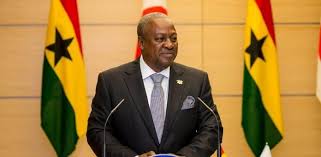President John Dramani Mahama has announced that Cabinet has approved the 24-Hour Authority Bill for onward submission to Parliament, marking another step in his administration’s drive to establish a 24-Hour Economy in Ghana.
Speaking at a media encounter at the Jubilee House in Accra on Wednesday, Mahama said several key institutions had already adopted round-the-clock operations as part of the policy. He mentioned the Ghana Publishing Company, which has transitioned to full 24-hour service delivery, as well as the Passport Office and Ghana’s foreign missions, which now operate day and night to improve passport processing for citizens at home and abroad.
The President also pointed to Tema and Takoradi ports, which have moved to 24-hour operations in order to ease congestion, speed up cargo clearance, and boost trade efficiency. He added that the government had established a dedicated 24-Hour Economy Policy Secretariat at the Ministry of Interior to ensure that security measures keep pace with the expanded working environment. According to him, these moves signal a strong national commitment to building a resilient, inclusive, and job-rich economy.
On the economic front, President Mahama said Ghana had achieved major progress in stabilising prices, reducing inflation, and regaining investor confidence. He noted that inflation, which stood at 23.8 per cent in December 2024, had dropped to 11.5 per cent in July 2025. This, he said, is the lowest inflation rate recorded since December 2021.
“But this isn’t just about numbers, it’s about being felt across markets and homes. The prices of key commodities are falling, and for the first time in years, brands and businesses are actively advertising their price reductions, a sign that recovery is not only real but tangible,” Mahama said.
He revealed that official trade associations had presented data to Parliament showing that up to 4,500 different items had recorded price reductions in the market. “It’s about making the Ghanaian household feel the impact in their everyday lives. As the popular saying goes, the real economy is not in statistics but in the pockets of the people,” he added.
The President explained that the government had been consistent in meeting its bond repayment obligations, a factor that he said had boosted investor confidence. He disclosed that S&P Global Ratings had upgraded Ghana’s country credit risk from junk to B- with a stable outlook. He described this as a strong endorsement of Ghana’s economic recovery and a signal of renewed trust from global markets.
To maintain the momentum of the recovery, Mahama said the government was implementing bold, job-creating initiatives, with the 24-Hour Economy policy at the centre. He explained that the initiative was designed to modernise agriculture, support micro, small and medium-sized enterprises, and expand employment opportunities across critical sectors.
According to him, the 24-Hour Economy is not simply about extending business hours but about unlocking new shifts of productivity that would create jobs, boost output, and build resilience in the economy. “This Initiative is not just about keeping the lights on longer, it is about unlocking new shifts of productivity, widening access to jobs, and building a resilient, inclusive economy that works for all,” Mahama said.
Analysts say the policy could be transformative for Ghana’s economy if effectively implemented, as it could reduce unemployment, improve service delivery, and position Ghana as a competitive hub for trade and investment in West Africa. The government’s emphasis on security through the Ministry of Interior’s 24-Hour Economy Secretariat is also seen as critical, given the need to protect businesses, workers, and communities in a round-the-clock economic system.
With Ghana’s inflation easing, the currency showing signs of stability, and investor sentiment improving, Mahama’s government is betting on the 24-Hour Economy initiative to further consolidate gains and spread the benefits of recovery to ordinary households. For many Ghanaians, the key test will be whether the policy can create sustainable jobs and reduce the cost of living in practical ways.
